
The Urban Institute’s How Housing Matters website has published an enlightening piece summarizing the current state of nationwide eviction data-gathering, as well as describing the critical role this data can play in informing public policy. As Eviction Lab Principal Investigator Matthew Desmond explains,
“Eviction is a giant problem that we only know is giant because of being in touch with communities. But we had no national eviction database. That’s akin to not knowing how many car accidents or cancer cases there are each year. It’s important to know what cities have the highest and lowest eviction rates and to learn what’s working. We’ve been designing policy in the dark.”
Besides laying out the benefits of the new database, the article also details the challenges and remaining obstacles in acquiring eviction numbers for the entire country. You may have noticed on our eviction map, for example, that some states and localities are flagged with the symbol ![]() , denoting what we judge to be an undercount, while some others list eviction numbers as “unavailable.” These are reflective of gaps in data access: some states have missing or incomplete records, while others restrict access in the interest of shielding renters from the stigma of a publicly-accessible eviction judgment.
, denoting what we judge to be an undercount, while some others list eviction numbers as “unavailable.” These are reflective of gaps in data access: some states have missing or incomplete records, while others restrict access in the interest of shielding renters from the stigma of a publicly-accessible eviction judgment.
The How Housing Matters article provides a helpful series of national maps that depict these areas of missing data. We are hopeful that revealing these gaps will prompt other researchers to help fill the void, as well as to nudge those more-restrictive states to find ways to balance important renter protections with the value of accommodating academic and public interest-driven research.
The article also points to additional areas where increased data access and further research would be helpful. For example, we don’t have reliable answers to the questions:
Knowing the answers to questions such as these can inform policy proposals that will be better tailored to the problems at hand in each locality.
Read the article: Robust Eviction Data Can Keep Cities from “Designing Policy in the Dark”